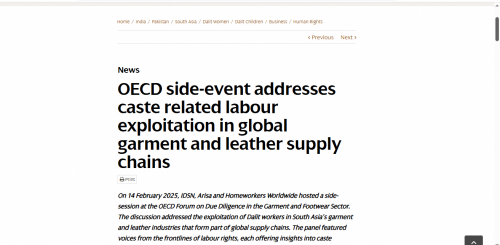
https://idsn.org/oecd-side-event-addresses-caste-related-labour-exploita...
Speakers discussed the prevalence of bonded and child labour in Pakistan’s leather and cotton industries. It was explained how Dalits remain trapped in exploitative labour due to social exclusion, lack of land ownership, and economic deprivation. Many work in hazardous conditions in leather workshops or cotton fields, often without protective gear or fair wages. The informal nature of much of this work means corporate due diligence efforts often overlook these workers. Companies were urged to address caste discrimination in their human rights policies and audits and ensure informal workers are recognized and receive protections.
Discrimination and violence faced by Dalit women in Tamil Nadu’s textile industry was highlighted. Dalit women garment workers endure long hours and unfair wages while facing caste-based abuse. Supervisors block their access to better-paying positions and prevent them from reporting harassment. The impact of the Dindigul Agreement, which established a commitment from brands, suppliers, and trade unions to prevent caste and gender-based violence and harassment in factories was highlighted. It was emphasised that brands must ensure independent, worker-led trade unions operate freely to prevent exploitation. Many garment factories in South India impose excessive work hours, leaving them physically and mentally exhausted. One way forward is to use training guides developed by NGOs working with Dalits to is help workers access their rights, strengthening Internal Complaints Committees (ICCs) and increasing awareness of grievance mechanisms.
Martje Theuws of Advocating Rights in South Asia (Arisa) shared findings from research on caste-based discrimination within garment and leather supply chains. Dalits are often assigned the lowest-paid and most hazardous jobs, such as handling toxic chemicals in leather tanneries or performing menial tasks in textile factories. This discrimination is embedded in supply chains, with marginalised caste workers routinely denied fair wages, job security and representation in workers’ committees. Despite global commitments to human rights due diligence, many brands hesitate to engage in discussions about caste discrimination with their suppliers. She stressed that companies need more than policy commitments; they must engage with Dalit-led organisations and ensure worker representation in decision-making processes.
Peter Williams of Homeworkers Worldwide (HWW) turned the conversation to homeworkers, one of the most invisible segments of the workforce. These women, primarily from Dalit and other marginalised backgrounds, produce garments and leather goods from their homes. Informally employed on a piece-rate basis, they are the women workers with the most precarious employment and lowest wages in many fashion and footwear chains. Without recognition, they remain trapped in poverty, earning below minimum wage. He described how suppliers deny the presence of homeworkers to avoid scrutiny, while brands fail to ask the necessary questions. However, he also shared examples of brands improving transparency and fair treatment through inclusive homeworker policies. Simple measures, such as tracking systems for payments and orders, help ensure fair compensation. He urged companies to adopt inclusive homeworker policies and work with labour rights organisations to protect these workers.
Next Steps for Companies
The discussion made it clear that businesses sourcing garments and leather goods from South Asia must take concrete steps to address caste discrimination and exploitation.
Key recommendations included:
- Acknowledge and address caste discrimination by integrating it into human rights due diligence policies for garment and leather supply chains.
- Enhance monitoring and accountability across all tiers of the supply chain, particularly in informal garment and leather workshops.
- Engage meaningfully with Dalit-led organisations to understand and tackle caste-based injustices within the industry.
- Support worker-led trade unions in garment and leather sectors to strengthen protections against exploitation and violence.
- Implement enforceable agreements that establish clear mechanisms for worker representation and grievance redressal in garment and leather factories.
- Carry out due diligence in the lowest tiers of the supply chains where risks are greatest and include homeworkers in due diligence and implementation
The session underscored the need for companies to urgently commit to meaningful action. By engaging with affected workers and organisations on the ground, brands can play a role in eliminating caste-based labour exploitation and ensuring that all workers are treated with dignity, fairness and respect.
Key documentation links referenced by the panellists:
ARISA’s Precarious labour and silenced workers – The position of workers from Scheduled Caste communities in the textiles and garment industry in Pakistan: https://arisa.nl/wp-content/uploads/Precarious-labour-and-silenced-workers_Arisa_TKF_PDSN.pdf
IDSN’s Caste in Global Supply Chains: https://idsn.org/no-more-silence-companies-must-address-caste-in-their-global-supply-chains/
Homeworkers Worldwide Toolkit: https://www.homeworkersww.org.uk/resources/hidden-homeworkers-toolkit









